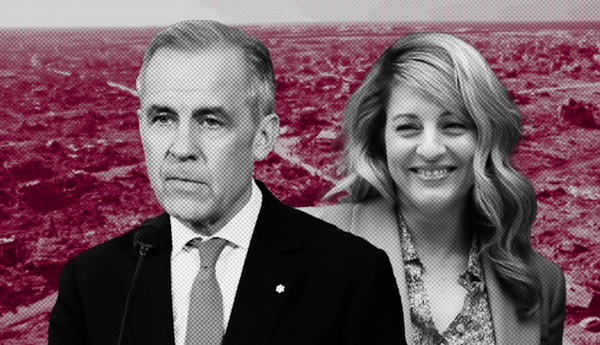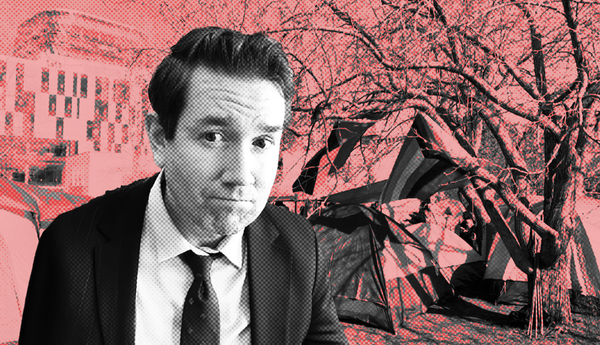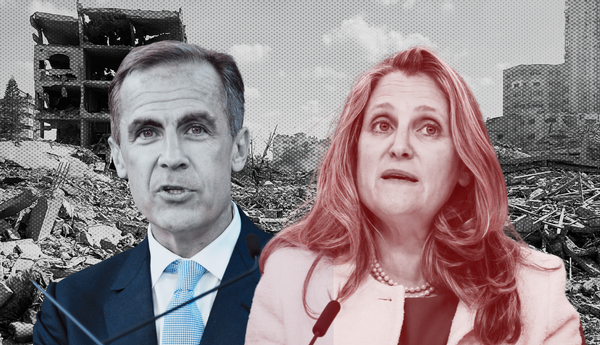A recent leak of nearly 12 million financial documents detailing how wealthy elites hide their money in offshore tax havens has renewed calls for governments around the world to crack down on aggressive tax avoidance.
Among those named in the Pandora Papers — first obtained by the International Consortium of Investigative Journalists and shared with media outlets around the world — are hundreds of Canadians, some of whom have been named in reports by the CBC and Toronto Star.
While many of the dealings exposed in the documents are legal, they raise questions about why wealthy individuals and corporations should be able to shelter funds from public authorities that could otherwise be used to finance important social programs.
Revelations in the documents prompted some to dub Canada a “laggard” when it comes to cracking down on tax avoidance and tax evasion. According to the Canada Revenue Agency, this country loses up to $15 billion per year to offshore havens.
The recent leak follows the Panama Papers leak of 2016, which similarly exposed how elites hid their wealth in offshore entities — often located in jurisdictions with little or no corporate tax — using shell corporations (entities that exist on paper and have no employees or offices) that make it hard to identify the true owners.
Toby Sanger, executive director of Canadians For Tax Fairness, told The Maple he was not surprised by the latest leak.
“It's a big leak, but it remains the tip of the iceberg,” said Sanger, who noted that many of those named in the documents are powerful people — in some cases world leaders — who “make the rules” around taxation.
What Is Canada Doing To Crack Down On Dirty Money?
A request for comment from The Maple about the Pandora Papers was declined by Finance Minister Chrystia Freeland, whose department directed questions to the CRA.
In a written statement, the CRA said it is committed to “combating international tax evasion and aggressive tax avoidance domestically and internationally” and that it supports “all efforts aimed at increasing global transparency.”
The CRA noted that Canada participates in dozens of international tax treaties and tax information exchange agreements. As well, the CRA is a member of the Joint Chiefs of Global Tax Enforcement, which was formed in 2018 to tackle transnational tax crime.
Back in April, the 2021 federal budget proposed $304.1 million over five years to help the CRA combat tax evasion and aggressive tax avoidance, as well as $2.1 million to support the establishment of a beneficial ownership registry by 2025.
Such a registry would compel private entities to disclose who their real owners are, making it harder for individuals to launder dirty money through complicated corporate structures or shell companies.
Sanger said establishing the registry is an important step, but that he wishes the timeline for putting it in place was accelerated.
“In the wake of this, I think that there should be some sort of global asset register,” he added. “I think, to do a good job, (the Canadian registry) will cost more, because they'll want to make sure that the information is accurate.”
Another positive development in terms of international tax reform, said Sanger, is an agreement expected to be reached in the coming days among OECD countries to impose a minimum 15 per cent corporate tax rate.
However, Sanger continued, while these reforms amount to steps in the right direction, he believes most of the tax justice movement would say they’re not enough.
“We should have that type of (tax) for individuals as well, and for income derived from other countries, and particularly tax havens.” said Sanger.
Critics are also concerned that the OECD reforms would primarily benefit the U.S., where most multinationals are based. As well, the levy could target as few as 100 large corporations, according to The Guardian.
Another problem regarding tax havens highlighted by Sanger’s organization is double non-taxation agreements between Canada and tax havens like the Cook Islands, which enable individuals and corporations to bring their money back into Canada or an offshore jurisdiction without paying tax.
Such agreements were signed under the Harper and Trudeau governments as part of tax-information sharing agreements which were established in the name of promoting “transparency.”
However, “they implicitly allow people to bring back their income without any additional Canadian taxes,” said Sanger, whose organization wants to see such agreements ended, as well as stiffer penalties for those who engage in aggressive tax avoidance and tax evasion.
“It's not just the penalties, but it's a willingness to actually go after them; Canada hasn't,” Sanger added. “There's been no charging of large corporations for tax evasion.”
As noted by the Star, the CRA assessed taxes and penalties on 40 Canadians who were named in the Panama Papers, but not a single charge has been laid against them.
Corporations Shift Profits To Avoid Taxes
Another issue regarding tax havens, said Sanger, is the ability of some large corporations to set up subsidiaries located in low-tax jurisdictions, and allocate profits to those subsidiaries to avoid higher tax rates.
For example, Cameco, a Canadian multi-billion dollar uranium mining company, set up a trading subsidiary decades ago in Zug, Switzerland, which has a notoriously low corporate tax rate.
“Large multinational corporations and or enterprises will shift their profits to other jurisdictions using a variety of means,” Sanger explained. “The whole system is so kind of broken and rigged, and complicated, and hard to police.”
Sanger said Canada should support international rules that would treat multinational corporations as single entities and require that companies allocate profits based on “real economic factors,” such as sales and employment, as is currently required between Canadian provinces.
“Canada should promote what we do nationally at an international level,” Sanger explained, adding that the new OECD agreement will do that to a limited degree.
“But they're just going to do it on the basis of sales, as far as we know, not employment, so that's more preferential towards countries where there are more sales; that's the wealthier countries generally,” Sanger added.
Old Boys Club
Angella MacEwen, a senior economist at the Canadian Union of Public Employees and former NDP candidate for Ottawa Centre in the recent federal election, said many Canadians don’t think of this country as being a part of tax avoidance schemes, but that the Pandora Papers highlight a need for legal and regulatory changes.
“During the election, all of the parties were talking about getting more resources to the CRA to do this type of investigation,” MacEwen told The Maple.
MacEwen noted the CRA has taken people to court over aggressive tax avoidance, but has lost cases because although such activities often fall outside the spirit of tax laws, they are not outside the letter of the law.
“We need to really think about how the legal system allows this type of behavior to proliferate in Canada,” said MacEwen, “but there are some pretty significant vested interests in these systems and who benefits from them.”
MacEwen said the problem speaks to a broader “old boys club” culture, whereby wealthy individuals with the means to engage in aggressive tax avoidance — which is itself an expensive endeavour — also have the means to pay steep legal fees to defend themselves with top-notch lawyers.
“It's like there's a separate set of rules for people who can afford to buy these services,” said MacEwen.
NDP Finance Critic Says Liberals Have Not Properly Addressed The Issue
Peter Julian, who was recently re-elected as the member of Parliament for New Westminster—Burnaby and serves as the NDP’s finance critic, accused the Liberal government of doing little to address aggressive tax avoidance besides “spin.”
“The reality is that those funds, that are taxpayers’ money, are supposed to be invested to help Canadians,” Julian told The Maple, adding that such funds could have been used for affordable housing, addressing climate change and providing Indigenous communities under boil water advisories with access to clean drinking water.
The NDP finance critic said he thinks the funds promised in this year’s budget for establishing a beneficial ownership registry is “not even close to what is sufficient.”
“At the same time, the government's timelines are years from now, rather than dealing with it as the emergency that it is,” he continued, adding that he thinks the signing of double non-tax agreements has aided tax avoidance.
“These are the kinds of actions that have helped to promote what is a massive blight,” said Julian. He noted that in 2019, a report by the Parliamentary Budget Officer found that as much as $25 billion in public revenue was lost to legal tax avoidance schemes in 2016.
Shortly after the recent election, NDP Leader Jagmeet Singh said one of his top priorities in the next Parliament would be pressuring the Liberal minority government to introduce a wealth tax.
Asked if the NDP would now also prioritize calling for tougher action on tax avoidance in the wake of the Pandora Papers leak, Julian said his party would be focusing on a “series of crises” currently facing Canadians.
“And that's why we've come back to the wealth tax, the pandemic profits tax (and) cracking down on overseas tax havens,” he added.
Editor's note, October 8, 2021: Following the publication of this story, the OECD announced that a deal to impose a 15 per cent minimum corporate tax rate on multinationals starting in 2023 was finalized. In response, Toby Sanger of Canadians for Tax Fairness issued a statement criticizing the deal, writing:
"Canada has just signed onto an OECD agreement that will give tech giants a massive tax break compared to what they would pay through Digital Services Taxes to many countries, including Canada ... The Digital Services Tax, which is supported by all parties in Parliament, was due to come into effect 1 January 2022, but would be eliminated as part of this OECD deal."
Read Sanger's full analysis here.
Alex Cosh is the managing editor of The Maple.







